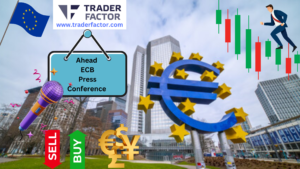The European Central Bank (ECB) has made its widely expected move, raising key rates by 25 basis points (bps) following the July policy meeting.
As a result, interest rates on the main refinancing operations, marginal lending facility, and deposit facility will increase to 4.25%, 4.5%, and 3.75% respectively.
In the policy statement, the ECB reaffirmed its commitment to setting rates at levels restrictive enough to achieve its 2% inflation target in the medium term. It will base future decisions on the outlook for inflation, underlying inflation dynamics, and the strength of monetary policy transmission.
Other important points from the policy statement include:
Remuneration of minimum reserves will be set at 0% to maintain the effectiveness of monetary policy and ensure full pass-through of interest rate decisions to money markets.
The ECB plans to reinvest principal payments from maturing securities purchased under the programme until at least the end of 2024.
Market Reaction
The initial reaction to the ECB’s policy announcements saw the Euro experience modest selling pressure. At the time of writing, the EUR/USD pair was still up 0.25% on a daily basis, trading near 1.1100.
With the ECB expected to continue its rate hike path, all eyes will be on ECB President Christine Lagarde’s press conference, which is likely to ramp up volatility around the Euro.
EUR/USD has been flirting with 1.1100 after hitting its highest level in 17 months above 1.1200 last week, as anticipation builds ahead of the ECB policy announcements.
Read Next: Fed Raises Interest Rate to 5.25-5.5%, Market Reacts
How Does The ECB Policy Announcements Affect Currency
The ECB policy announcements can have a significant impact on the currency. Here’s a breakdown of how these announcements affect the currency:
Interest Rates
One of the key tools used by the ECB is adjusting interest rates. When the ECB announces a change in interest rates, it directly affects the cost of borrowing and lending in the economy. A higher interest rate tends to attract foreign investors seeking better returns, leading to increased demand for the currency and potentially strengthening its value. Conversely, lower interest rates may reduce the appeal of holding the currency, potentially leading to a depreciation.
Monetary Policy Decisions
The ECB’s monetary policy decisions, which are communicated through press releases, can influence market sentiment and expectations. Favorable policy decisions that support economic growth and stability can boost investor confidence in the currency, potentially leading to appreciation. On the other hand, if policy decisions are perceived as unfavorable or uncertain, it may weaken investor confidence and lead to currency depreciation.
Inflation Outlook
The ECB also communicates its stance on inflation through its policy announcements. If the ECB expresses concerns about high inflation or indicates a need to tighten monetary policy to control inflation, it can strengthen the currency. Conversely, if the ECB expresses concerns about low inflation or signals a need for accommodative policies, it may weaken the currency.
Market Reaction
The currency markets closely follow ECB policy announcements, and the immediate market reaction can play a significant role in determining the currency’s value. Traders and investors analyze the announcements, assess their implications for the economy and financial markets, and make buying or selling decisions accordingly. Market sentiment, liquidity, and trading volumes can all be influenced by the ECB’s policy announcements, leading to currency fluctuations.
It’s important to note that the impact of ECB policy announcements on the currency is not always straightforward and can be influenced by various factors such as economic conditions, global market trends, and geopolitical events. Traders and investors closely monitor these announcements and the subsequent market reactions to make informed decisions regarding the currency.
Source: European Central Bank
Disclaimer:
All information has been prepared by TraderFactor or partners. The information does not contain a record of TraderFactor or partner’s prices or an offer of or solicitation for a transaction in any financial instrument. No representation or warranty is given as to the accuracy or completeness of this information. Any material provided does not have regard to the specific investment objective and financial situation of any person who may read it. Past performance is not a reliable indicator of future performance.
Author
-

Phyllis Wangui is a Financial Analyst and News Editor with qualifications in accounting and economics. She has over 20 years of banking and accounting experience, during which she has gained extensive knowledge of the forex, stock news, stock market, forex analysis, cryptos and foreign exchange industries. Phyllis is an avid commentator on these topics and loves to share her insights with others through financial publications and social media platforms.
View all posts



















